Supreme Court to hear case of worker fees to Big Labor
Justice Gorsuch's views on union fees seen as pivotal.
A landmark Supreme Court case to be heard Monday and decided by June could significantly improve the plight of public employees and the people they are tasked to serve.
The case of Mark Janus – the plaintiff in Janus v. AFSCME – is relatively straightforward. Illinois does not have a right-to-work law, so Janus is forced to pay dues to the American Federation of State, County and Municipal Employees union or risk being fired from his job as a child support specialist for the state.
Janus argues that in negotiating with the government, the union directly affects public policy issues, making its collective bargaining inherently political – and the union advocates on behalf of causes he does not wish to support.
The First Amendment to the Constitution protects against compelled speech, so Janus believes he should not be forced to pay a union that he says “is not my voice.”
An essentially identical case, Friedrichs v. California Teachers Association, ended in a 4-4 tie decision in the Supreme Court in 2016 following the death of Justice Antonin Scalia. With Scalia having been replaced by constitutionalist Justice Neil Gorsuch, there is ample reason to believe Janus will succeed. This would could extend full right-to-work protections to every public employee in America.
This is already the law for federal employees and in some 28 right-to-work states. But a favorable ruling in the Janus case could free more than 5 million public employees in the remaining 22 states, including Illinois.
Government unions are different from private-sector unions in several ways – none more crucial than that they help elect the government officials who sit across the bargaining table.
These perverse incentives are why public-sector collective bargaining was banned entirely until relatively recently and why even progressive titans Franklin Roosevelt and former AFL-CIO President George Meany raised objections to it.
Today the effect of government unions goes beyond depriving public employees of their First Amendment rights and taking money from their paychecks. Through their collective bargaining, government unions consistently advocate higher taxes and more spending, which is why states with the most powerful government unions are also largely those in the worst fiscal condition.
The effects are felt throughout the education system as well. Two Cornell University academics recently released a study concluding that “teacher collective bargaining worsens the future labor market outcomes of students.”
The study states that “living in a state with duty-to-bargain laws” – which mandate that districts recognize and negotiate with unions – “for all 12 grade-school years reduces earnings by $800 (or 2 percent)” and that teacher collective bargaining reduces earnings by nearly $200 billion annually in the United States.
The study also found “that collective bargaining leads to sizable reductions in measured cognitive and non-cognitive skills among young adults.”
Reasonable people can disagree on any of the issues at stake in government union negotiations, but simple fairness dictates that no one should be forced to fund political advocacy against his or her will. And yet in 22 states, teachers and public employees like Mark Janus are forced to do so. Why?
Union leaders claim forced dues are necessary to maintain “labor peace” and cover the cost of bargaining as “exclusive representatives” in the workplace. But neither of these arguments holds water.
Forced dues are constantly used outside the workplace to advance an overtly political agenda. Moreover, Bureau of Labor Statistics data shows that public employees are significantly more likely to go on strike in forced-unionism states than in right-to-work states.
Finally, the so-called “free rider” problem of non-members benefiting from union representation does not require a violation of the First Amendment; a simple proposal known as “worker’s choice” would allow unions to represent dues-paying members only. But when such legislation was introduced in Kansas and Michigan, unions vehemently opposed it.
The Janus case presents an opportunity to expand freedom to millions more public employees, many of whom would undoubtedly exercise that freedom. Fully aware of these potential consequences, unions are looking ahead and seeking to prevent workers from escaping forced dues, either through contract gimmicks or by using government bureaucracy to block groups that educate workers on their rights.
But all Americans have a stake in the success of the Janus lawsuit, so that no one is any longer forced to fund speech with which they disagree.

